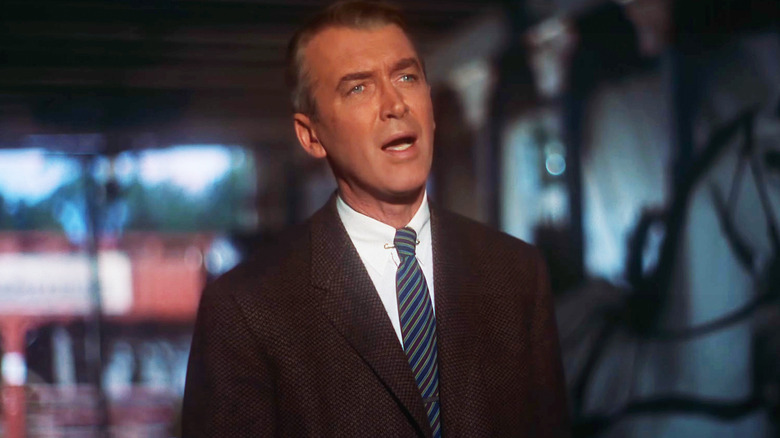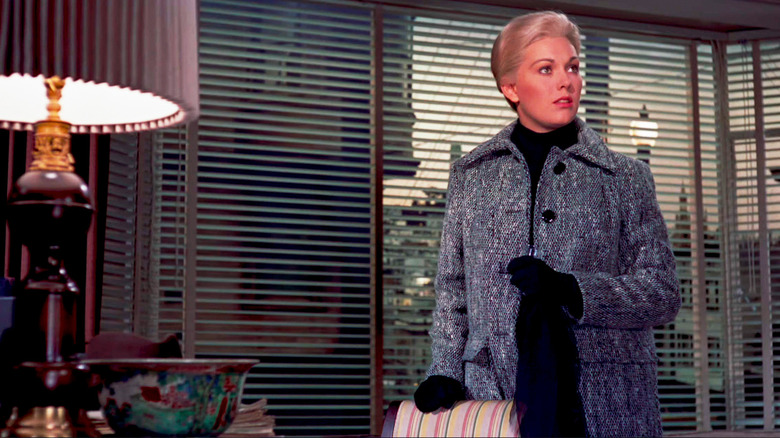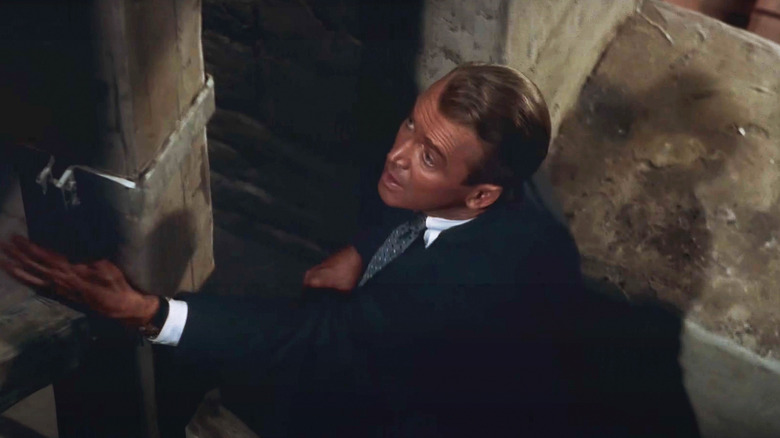Bernard Hermann's Score Was The Star Of The Show When It Came To Restoring Vertigo
For a long time, "Vertigo" was consigned to the vault. Once the rights to Hitchcock's masterpiece reverted back to the director in the '60s, he kept the film under lock and key right up until his death in 1980. Universal then got their hands on the rights and in the 1990s decided "Vertigo" was due an overhaul.
The studio set about restoring the 1958 classic to its former glory via an in-depth process that involved creating new negatives in 35mm and 65mm and reportedly finding original elements of the film in the US, Germany, Italy, and Spain. Along with the visual restoration, Hitchcock's dreamy tale of obsession and madness also got a full, and controversial, audio overhaul. As former head of Universal Classics, James C. Katz, recounted upon the 1996 release of the restored movie, both the score and dialogue were given a digital stereo remaster alongside a newly recorded Foley track. Yes, they re-recorded the original ambient sounds for the '96 remaster, adding their own version of the sound effects using Hitchcock's original dubbing notes. No wonder the whole thing was controversial.
But Katz and his team at least did their best to preserve Bernard Hermann's score, which remains one of the finest in movie history. The Sinatra and Riddle of the contemporary film world of the '50s, Hitchcock and Herrmann simply made each other's work better. And it seems Katz at least knew that much, working diligently to preserve Herrmann's score while converting it to digital stereo.
The 'third star' of the Vertigo
In an interview at the time of the restoration's release, Katz and film historian Robert A. Harris spoke about their work on reviving "Vertigo." Katz made clear that he considered Herrmann's score the "third star, or fourth star, of the film," behind the actual stars James Stewart and Kim Novak. As such, the soundtrack underwent a full digitization and mixing process to convert it to DTS digital stereo — a process that threw up its own set of challenges.
The biggest issue was the fact that a lot of the magnetic oxide prints, which contained the original three-track stereo recordings, "rotted differently" while sitting in the Paramount vaults. In one case, the deterioration was so bad, the entire score from the scene where Stewart's Scottie follows Novak's Madeline at the Mission Dolores was completely lost. That forced Katz and Harris to search for an alternative, which came in the form of an optical track from the Spanish language print of "Vertigo."
Once they had the score together, Universal's sound department gave it a full remaster, spreading it and making it "sound rich and full." The result was a truly reinvigorated version of Herrmann's original arrangements. Katz and Harris even tested a version of the movie with extra sound effects added for filmmaker Martin Scorcese, who according to Harris, quickly nixed the new sounds, pointing to the fact that he had worked with Herrmann on "Taxi Driver" and knew the composer hated sound effects over the top of his music. With Scorcese's input, Harris and Katz had covered their bases and did such a thorough job enhancing the "third star" of the movie that Harris said when he played the film for "Bernard Herrmann's people, they actually heard instruments and notes they'd never known were there."
Restoring Hitchcock's most personal film
"Vertigo" is widely considered to be one of Hitchcock's most personal films in the sense that it examines obsession in a way that closely mirrors the director's own fixation on his movies — especially the actresses that star in them. It's been said that's why the master of suspense held onto "Vertigo" up until his death. That, and he might well have wanted to increase the film's value by keeping it from being screened anywhere. Whatever the reason, "Vertigo" has gained a legendary status, not just among Hitchcock movies, but in the history of film. It nabbed the number one spot in the 2012 Sight And Sound poll of the greatest films ever made, and always claims a top spot on lists of Hitchcock's best films.
That must have made the task of restoring it for a new generation pretty daunting for Harris and Katz. Thankfully, they both appreciated how important Herrmann's music was to the movie. The composer's eerie and menacing score helps heighten the overall creepiness of "Vertigo" in a way that only Herrmann's arrangements could. Re-recording elements was never an option, and it's a good thing that the restorers knew this. Had the original recordings rotted more than they had when Katz and Harris found them, who knows what kind of unworthy recreation could have been unleashed.


